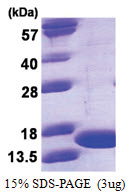Tumor necrosis factor (TNF-alpha) (80-235) Mouse Protein
CAT#: AR50300PU-S
Tumor necrosis factor (TNF-alpha) (80-235) mouse recombinant protein, 0.1 mg
Size: 500 ug
Other products for "Tnf"
Specifications
| Product Data | |
| Species | Mouse |
| Expression Host | E. coli |
| Expression cDNA Clone or AA Sequence |
MLRSSSQNSS DKPVAHVVAN HQVEEQLEWL SQRANALLAN GMDLKDNQLV VPADGLYLVY SQVLFKGQGC PDYVLLTHTV SRFAISYQEK VNLLSAVKSP CPKDTPEGAE LKPWYEPIYL GGVFQLEKGD QLSAEVNLPK YLDFAESGQV YFGVIAL
|
| Predicted MW | 17.4 kDa |
| Concentration | lot specific |
| Purity | >95% by SDS - PAGE |
| Presentation | Purified |
| Buffer | Presentation State: Purified State: Liquid purified protein Buffer System: Phosphate buffered saline (pH 7.4) |
| Endotoxin | < 1 EU per 1ug of protein (determined by LAL method) |
| Preparation | Liquid purified protein |
| Protein Description | Recombinant mouse TNFa protein was expressed in E.coli and purified by using conventional chromatography. |
| Storage | Store undiluted at 2-8°C for one week or (in aliquots) at -20°C to -80°C for longer. Avoid repeated freezing and thawing. |
| Stability | Shelf life: one year from despatch. |
| Reference Data | |
| RefSeq | NP_001265530 |
| Locus ID | 21926 |
| UniProt ID | P06804, A0A0R4J210 |
| Cytogenetics | 17 18.59 cM |
| Synonyms | DI; DIF; Tn; TNF-; TNF-a; TNF-alpha; Tnfa; TNFalpha; Tnfs; Tnfsf1a; TNFSF2; Tnlg1f |
| Summary | This gene encodes a multifunctional proinflammatory cytokine that belongs to the tumor necrosis factor (TNF) superfamily. Members of this family are classified based on primary sequence, function, and structure. This protein is synthesized as a type-II transmembrane protein and is reported to be cleaved into products that exert distinct biological functions. It plays an important role in the innate immune response as well as regulating homeostasis but is also implicated in diseases of chronic inflammation. In mouse deficiency of this gene is associated with defects in response to bacterial infection, with defects in forming organized follicular dendritic cell networks and germinal centers, and with a lack of primary B cell follicles. Alternative splicing results in multiple transcript variants. [provided by RefSeq, Jun 2013] |
Documents
| FAQs |
| SDS |
Resources
Recombinant Protein Resources |
{0} Product Review(s)
0 Product Review(s)
Submit review
Be the first one to submit a review
Product Citations
*Delivery time may vary from web posted schedule. Occasional delays may occur due to unforeseen
complexities in the preparation of your product. International customers may expect an additional 1-2 weeks
in shipping.






























































































































































































































































 Germany
Germany
 Japan
Japan
 United Kingdom
United Kingdom
 China
China
